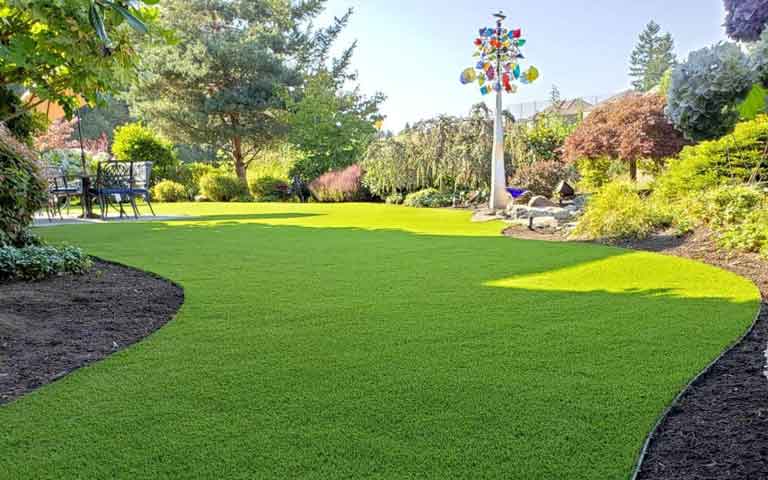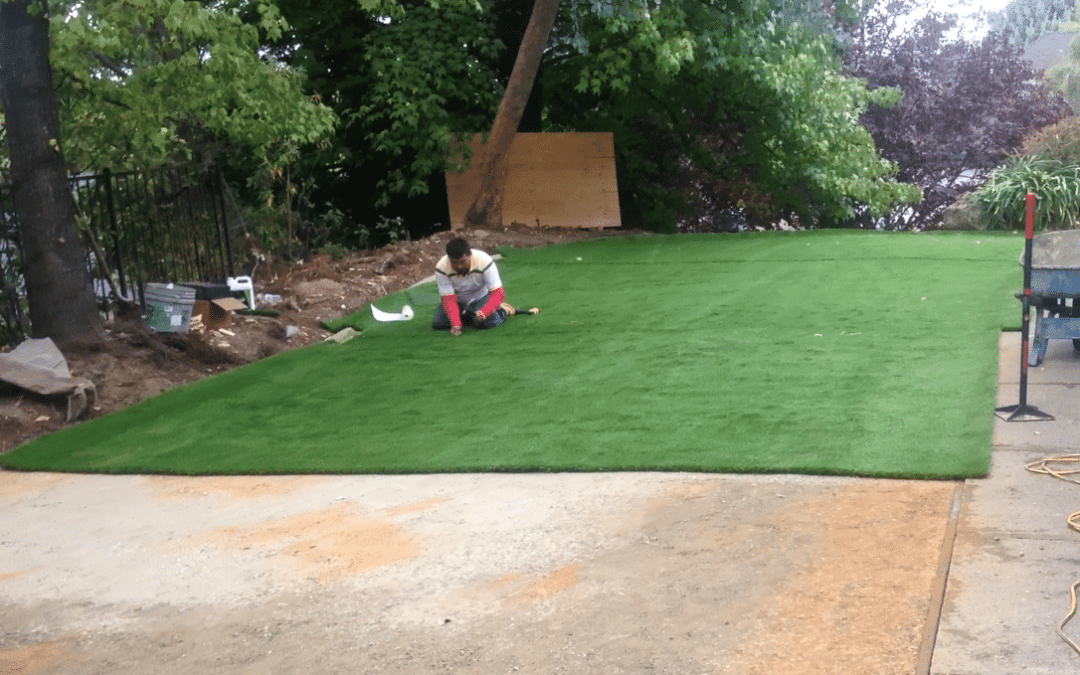Top Factors to Consider Artificial Yard for a Low-Maintenance and lush Lawn
As homeowners increasingly look for lasting remedies for exterior spaces, synthetic grass presents an appealing alternative to standard grass. The benefits prolong beyond mere aesthetics and sustainability; checking out the multifaceted implications of fabricated yard discloses a detailed strategy to backyard administration that advantages deeper consideration.
Year-Round Plant
Among the most significant benefits of artificial yard is its capability to give year-round greenery, no matter of climate problems. Homeowners usually face obstacles in preserving a vivid yard as a result of seasonal modifications, droughts, or hefty rainfall. Fabricated turf removes these issues, ensuring a continually rich look throughout the year.
This synthetic choice is crafted to endure diverse climate situations, from blistering summer warm to freezing winter months temperature levels. Unlike all-natural yard, which may brownish or come to be patchy during extreme problems, artificial grass keeps its vivid color and appearance, boosting the aesthetic charm of any type of landscape.
In addition, fabricated turf is immune to parasites and diseases that generally affect all-natural grass. This resilience contributes to its enduring charm, as there is no requirement for chemical therapies or plant foods that can be harmful to the environment. House owners can take pleasure in the aesthetic advantages of a properly maintained grass without the intermittent challenges presented by natural turf care.
Reduced Upkeep Efforts
Man-made turf substantially decreases maintenance efforts, permitting homeowners to enjoy a pristine grass without the lengthy tasks linked with all-natural turf care. Among the most remarkable benefits of synthetic turf is the removal of routine mowing. Without need for a lawnmower, property owners save both time and the price of maintenance connected with this tools.

Cleaning artificial yard is uncomplicated; a simple rinse with a hose pipe or the occasional brushing to get rid of debris is generally sufficient - turf installation. This convenience of treatment permits homeowners to invest even more time enjoying their outdoor spaces as opposed to struggling over them. In recap, the reduced upkeep initiatives connected with fabricated turf make it an attractive option for those seeking a lovely, easy backyard
Water Conservation Benefits
The substantial decrease in maintenance initiatives connected with man-made turf includes water preservation, making it an eco-friendly alternative for house owners. Conventional grass need substantial amounts of water to remain lavish and dynamic, typically leading to too much water usage, specifically in arid areas. On the other hand, fabricated yard gets rid of the demand for regular watering, significantly lowering the overall water consumption in your lawn.
By selecting synthetic lawn, property owners can conserve countless gallons of water yearly. This shift not just advantages private houses but also adds to broader ecological campaigns focused on minimizing water waste. In areas experiencing water shortage, the fostering of artificial turf can play a significant function in mitigating the impacts of dry spell and ensuring that important water sources are used more effectively.
Moreover, the installment of artificial turf can help reduced metropolitan water demand, benefiting the neighborhood all at once. With growing recognition of ecological issues, choosing synthetic yard click here to find out more acts as a proactive step towards lasting landscape design, aiding to maintain all-natural water resources while maintaining an aesthetically pleasing outdoor area (backyard artificial grass). In recap, fabricated yard offers an engaging remedy for water conservation, aligning ecological duty with modern-day landscape design requirements

Parasite and Allergic Reaction Reduction
A substantial advantage of mounting synthetic grass is its ability to decrease pests and irritants in exterior areas. Typical turf yards typically work as breeding premises for insects such as mosquitoes, ticks, and ants, which can develop discomfort and wellness risks for households and pets. On the other hand, man-made grass gets rid of the natural product that attracts these insects, consequently significantly reducing their populaces in your yard.
Furthermore, all-natural yard can nurture mold, plant pollen, and various other allergens, which can cause allergic reactions and respiratory problems for delicate people. Artificial lawn provides a cleaner environment, decreasing the possibility for allergenic reactions. Unlike natural turf, synthetic grass does not generate plant pollen, making it an excellent choice for allergy patients seeking to enjoy check out this site their outside areas without the threat of flare-ups.
In addition, the lack of dirt in man-made grass indicates there is less dust and dirt, further reducing airborne allergens. This low-maintenance alternative not only enhances the aesthetic appeal of your backyard yet additionally advertises a healthier outdoor atmosphere, enabling households to appreciate their lawns without the continuous concern of allergens and pests. Therefore, synthetic turf is a tactical option for those prioritizing convenience and wellness in their exterior living spaces.
Long-Term Price Cost Savings
Investing in artificial turf can lead to significant long-term price savings for home owners. Fabricated turf removes the requirement for normal grass maintenance expenditures, such as mowing, fertilizing, and watering.
Additionally, the longevity of synthetic lawn even more improves its cost-effectiveness. The majority of top quality artificial lawn items can last 15 to 25 years with very little maintenance, reducing the need for substitute or considerable repair work. On the other hand, all-natural yard may need constant reseeding and regular care, which can rapidly include up in costs.
Utility cost savings are an additional crucial aspect. Property owners can anticipate to see lower water bills, as synthetic grass does not need watering. Furthermore, the decrease in lawn care services can liberate useful time and sources, enabling home owners to allocate their budgets elsewhere.
Conclusion
In summary, synthetic turf provides many benefits for home owners looking for a low-maintenance and vivid landscape. Its capability to supply year-round plant, combined with minimized maintenance efforts and considerable water conservation, makes it an appealing choice. Additionally, the decrease of irritants and insects contributes to a healthier outdoor environment. Inevitably, the lasting expense savings associated with synthetic grass strengthen its condition as a functional and sustainable service for enhancing exterior areas.
Synthetic grass significantly reduces maintenance initiatives, allowing home owners to take pleasure in a beautiful grass without the lengthy tasks associated with all-natural turf treatment.The significant decrease in upkeep efforts connected with artificial lawn extends to water preservation, making it an eco friendly alternative for home owners. In contrast, fabricated grass removes the need for routine watering, drastically lowering the total water consumption in your lawn.
In locations experiencing water scarcity, the fostering of fabricated lawn can play a significant function in minimizing the effects of drought and making sure that valuable water sources are utilized a lot more successfully.
With expanding awareness of environmental click to find out more problems, choosing man-made yard offers as a proactive step towards sustainable landscaping, assisting to protect all-natural water resources while keeping a cosmetically pleasing outdoor area.